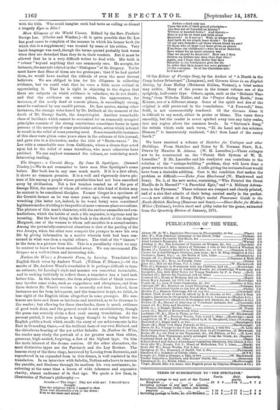before. Her book has in any case much merit. If
it is a first effort, it shows no common promise. It is a well and vigorously drawn pic- ture of life among a people whose peculiarities had not been smoothed away by civilisation. Not a few touches remind us of the pen of George Eliot, the master of whom all writers of this kind of fiction may be content to be considered disciples. Farmer Gregor is a specimen of the Cornish farmer as he was some years ago, when smuggling and wrecking (the latter not, indeed, in its worst form) were considered legitimate modes of adding to the profits of more common-place avocations.
The picture of this man's character, with the curious anomalies and con- tradictions, which the habits of such a life engender, is vigorous and in- teresting. But the best thing in the book is the sketch of the daughter Margaret, one of the women to whom self-sacrifice is a second-nature.
Among the powerfully-conceived situations is that of the parting of the two Averys, when the elder man compels the younger to save his own life by giving information in a matter wherein both had been con- cerned in what was then a capital offence. The visit of the " tinners " to the farm is a picture from life. This is a peculiarity which we may be content to know has been smoothed away. We can recommend The Gregors as a well-written and interesting tale.






























 Previous page
Previous page